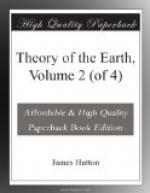The present Form of the Surface of the Earth explained, with a View of the Operation of Time upon our Land.
It is not to common observation that it belongs to see the effects of time, and the operation of physical causes, in what is to be perceived upon the surface of this earth; the shepherd thinks the mountain, on which he feeds his flock, to have been always there, or since the beginning of things; the inhabitant of the valley cultivates the soil as his father had done, and thinks that this soil is coeval with the valley or the mountain. But the man of scientific observation, who looks into the chain of physical events connected with the present state of things, sees great changes that have been made, and foresees a different state that must follow in time, from the continued operation of that which actually is in nature.
It is thus that enlightened natural history affords to philosophy principles, from whence the most important conclusions may be drawn. It is thus that a system may be perceived in that which, to common observation, seems to be nothing but the disorderly accident of things; a system in which wisdom and benevolence conduct the endless order of a changing world. What a comfort to man, for whom that system was contrived, as the only living being on this earth who can perceive it; what a comfort, I say, to think that the Author of our existence has given such evident marks of his good-will towards man, in this progressive state of his understanding! What greater security can be desired for the continuance of our intellectual existence,—an existence which rises infinitely above that of the mere animal, conducted by reason for the purposes of life alone.
The view of this interesting subject, which I had given in the first part, published in the Transactions of the Edinburgh Royal Society, has been seen by some men of science in a light which does not allow them, it would appear, to admit of the general principle which I would thereby endeavour to establish. Some contend that the rivers do not travel the material of the decaying land;—Why?—because they have not seen all those materials moved. Others alledge, that stones and rocks may be formed upon the surface of the earth, instead of being there all in a state of decay. These are matters of fact which it is in the power of men who have proper observation to determine; it is my business to generalise those facts and observations, and to bring them in confirmation of a theory which is necessarily founded upon the decaying nature and perishing state of all that appears to us above the surface of the sea.




